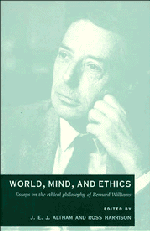Book contents
- Frontmatter
- Contents
- Notes on editors and contributors
- Introduction
- 1 The idea of equality revisited
- 2 Is the idea of purely internal consistency of choice bizarre?
- 3 Science, ethics, and objectivity
- 4 Fallibilism and objectivity: science and ethics
- 5 Might there be external reasons?
- 6 Aristotle on human nature and the foundations of ethics
- 7 A most peculiar institution
- 8 Reflection and confidence
- 9 The shape of a life
- 10 Replies
- Index
6 - Aristotle on human nature and the foundations of ethics
Published online by Cambridge University Press: 05 August 2012
- Frontmatter
- Contents
- Notes on editors and contributors
- Introduction
- 1 The idea of equality revisited
- 2 Is the idea of purely internal consistency of choice bizarre?
- 3 Science, ethics, and objectivity
- 4 Fallibilism and objectivity: science and ethics
- 5 Might there be external reasons?
- 6 Aristotle on human nature and the foundations of ethics
- 7 A most peculiar institution
- 8 Reflection and confidence
- 9 The shape of a life
- 10 Replies
- Index
Summary
The whole race is a poet that writes down
The eccentric propositions of its fate.
Wallace Stevens, ‘Men Made out of Words’And language he has taught himself
And thought swift as the wind
And city-dwelling inclinations.
Sophocles, AntigoneAristotle repeatedly mentions human nature in connection with ethical questions. Appeals to facts about our nature as human beings enter at crucial junctures into ethical arguments of various types, as if they did some sort of ethical work. But it is difficult to determine what sort of work they are intended to do, and how they do it. Take one example. Towards the beginning of Nicomachean Ethics 1, Aristotle tells us that the best life would seem to be one that is self-sufficient, autarkēs. This might naturally call to mind the solitary contemplative self-sufficiency of the Platonic philosopher. But now Aristotle adds a qualification. “By self-sufficient I mean not for the person himself, leading a solitary life, but for the person along with parents and children and a wife and in general his friends and fellow citizens, since the human being is by nature a political being” (1097b7–11). A fact about human nature is used to defend an ethical conclusion, the conclusion that we should prefer a communal conception of the good life to a more solitary conception. How does this work? For it seems that a serious opponent could object to Aristotle's proposal in at least two different ways.
- Type
- Chapter
- Information
- World, Mind, and EthicsEssays on the Ethical Philosophy of Bernard Williams, pp. 86 - 131Publisher: Cambridge University PressPrint publication year: 1995
- 117
- Cited by



